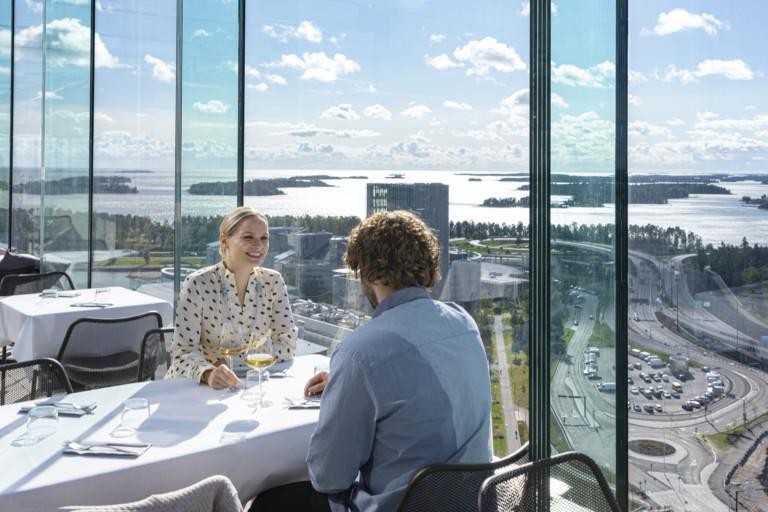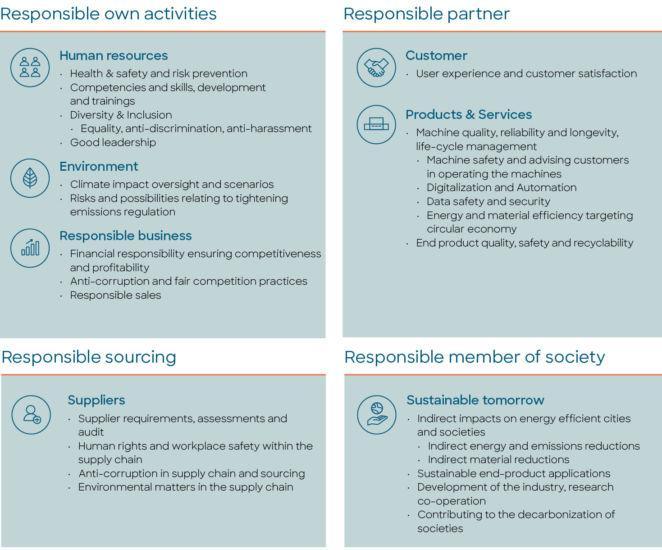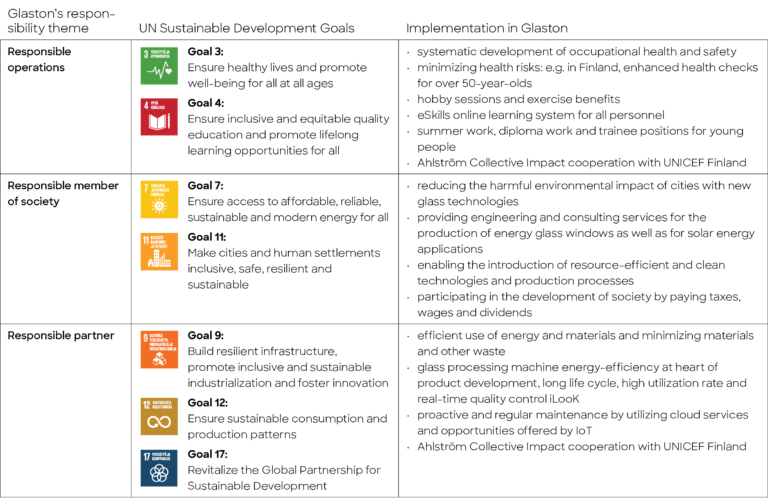Sustainability as an opportunity
As environmental awareness increases, demand for more energy-efficient and environmentally sustainable glass solutions is growing. Glaston views the promotion of sustainable development as a business opportunity, and as a frontrunner in our industry we are involved in creating industry standards and practices in relation to sustainability, such as for energy efficiency and safety.
In glass industry sustainability issues, there is an emphasis on the energy efficiency of glass manufacturing and further processing. Glass production processes are energy-intensive and the industry’s key goal is to further reduce its energy consumption as one means of reducing the industry’s carbon dioxide emissions.
In this, the energy efficiency of buildings plays a key role in transitioning to a clean and carbon-neutral economy. For example, 75% of the EU’s building stock is energy inefficient*), and heating and cooling of buildings account for half of final energy consumption in the EU. Therefore, improving the insulation of buildings is of great importance.
Of Glaston’s customer segments, the architectural and construction segment is the biggest. New standards, measures promoting carbon neutrality in Europe, and stricter legislation are supporting the use and development of more environmentally aware and energy-efficient solutions. At the same time, development of local control of construction with regard to safety and quality regulations is evident in many of Glaston’s market areas.
Glass will play a key role in achieving the energy efficiency targets for buildings in both new and renovation construction. The technologies developed by Glaston enable the production of more energy-efficient glass structures, and Glaston offers its customers a wide range of products and services that enable them to manufacture more energy-efficient windows and insulating glass units.
As environmental awareness grows, demand for solar energy and smart glass is growing. In addition to solar panels and cells, new applications of the future may include solar panels integrated into façades or windows to provide energy for buildings. In smart glass applications, windows that react to fluctuations in light or temperature, for example, improve the energy performance of buildings.
*) Source: Directive of the European Parliament and the Council on energy efficiency, 2021.

Energy efficiency of buildings in Europe
- The goal of the Renovation Wave Strategy, published by the European Commission in 2020, is to at least double the number of renovations over the next decade and to ensure that they lead to better energy and resource efficiency. The goal applies to around 35 million buildings.
- The project will be a significant driver of growth for Glaston’s business, as coated double and triple insulating energy-saving glass produced with Glaston’s technologies are key solutions in energy saving for windows and glass façades.
- The glass processing industry has actively developed types of glass that can be used effectively to reduce the need for heating and cooling and thereby change the energy consumption of buildings.
Managing sustainability
One of the focus areas of Glaston’s strategy is sustainability. To demonstrate this, the strategy has set four targets addressing sustainability. The work towards the set sustainability targets is steered by a roadmap, approved by the copmpany’s Executive Leadership Team and the Board of Directors, which includes a plan and a timetable of measures.
The Sustainability Policy describes the principles and priorities related to the management and leadership of the Group’s sustainability and defines the responsibilities for different functions. The policy can be downloaded here.
Material topics
At the end of 2021, Glaston updated the most material aspects of responsibility to reflect the new strategy and changes in the operating environment. The assessment also took into account the views of external stakeholders and the company’s own personnel.
The update revised the content of previously identified material themes. Glaston’s most material themes are:
- responsible own activities (personnel, environment, responsible business)
- responsible sourcing
- responsible partner and
- responsible member of society.
In connection with the materiality review, the most significant climate and biodiversity risks related to and arising from Glaston’s operations were also identified. Climate risks were mainly assessed as being medium or low.
Glaston’s climate risk management is reported in more detail in the financial statements, in connection with the Report of the Board of Directors.

Sustainability targets
In Glaston’s strategy, Group-wide strategic targets promoting sustainability have been set for the medium term (3-5 years):
- Safety target measured as zero lost time accidents (accident frequency, LTIFR)
- Employee engagement rate over 75 (out of 100)
- Customer satisfaction score (Net Promoter Score, NPS) over 40
- Glaston’s CO2 emissions from own operations (Scope 1+2) 50% down from 2022 level and value chain (Scope 3) CO2 emission intensity down by 58% per sqare meter of sold glass processing capacity by 2032
| TOPIC | INDICATOR | TARGET | OUTCOME 2023 | OUTCOME 2022 | TIMETABLE*) |
| Responsible business | Training of personnel in the Code of Conduct | Training coverage 100% | 98% | 93% | Continuous |
| Safe workplace | Accident frequency (LTIFR), # of accidents/million hours worked | Accident frequency zero | 6.3 | 3.9 | Continuous |
| Safe workplace | Reports of workplace harassment | No harassment cases | Three cases reported | One case reported | Continuous |
| Safe workplace | Employee engagement rate | Engagement rate >75 (of 100) | 70 | 70 | 2025 |
| Impacts on the environment | CO2 emissions in own operations | CO2 emissions (Scope 1+2) in relation to net sales down by 50% from the 2020 level**) | -61% | -57%, target achieved | 2025 |
| Impacts on the environment | Emissions in value chain | Calculate emissions and set target for emissions reduction | 322,644 tCO2e, target set and submitted to SBTi for validation | 648,150 tCO2e | 2032 |
| Responsible sourcing | Suppliers’ commitment to Glaston’s Supplier Code of Conduct | Commitment coverage 100% | 74% of main suppliers | 75% of main suppliers | 2025 |
| Responsible partner | Industry’s best customer experience | Customer satisfaction score (NPS) >40 | 62 | 53 | 2025 |
| Responsible partner | Technically advanced and material- and energy-efficient products | R&D, % of net sales | 4.2% | 4.3% | Continous |
*)In February 2024, Glaston adjusted the timeframe for reaching the strategic targets from 2025 to the medium term (3-5 years)
**) A new emissions reduction target covering the entire value chain was set in 2023
Sustainable development goals
Glaston supports the United Nations Sustainable Development Goals (SDGs), which will guide the sustainable development actions of member states, companies and other organizations up to 2030. We have identified seven goals that also emerge from our own strategy and are most relevant to us. These provide a broader frame of reference for our work and support the achievement of these goals in our own activities.

Reporting
The sustainability report describes Glaston Group’s operations in 2023. The content of the report and the themes covered are based on Glaston’s updated strategy as well as a materiality analysis updated in autumn 2021. The report covers the entire Group.
Download the Sustainability Report.
Articles
GPD 2023 Presentations – Sustainability and trends
The Glass Performance Days 2023 conference brought forward a compelling array of presentations focused on sustainability and emerging trends within the glass industry....
Read moreUnlocking energy efficiency potential: vacuum-insulated glazing for sustainable buildings
Do you know that uplifting existing building stock with high-performance insulating windows will decrease the building sector’s total energy consumption by 40%...
Read moreAeroShield at Step Change 2023 event
AeroShield makes the world’s most transparent silica aerogels. Silica aerogel is a super-insulating material. And our innovation was making it transparent...
Read more